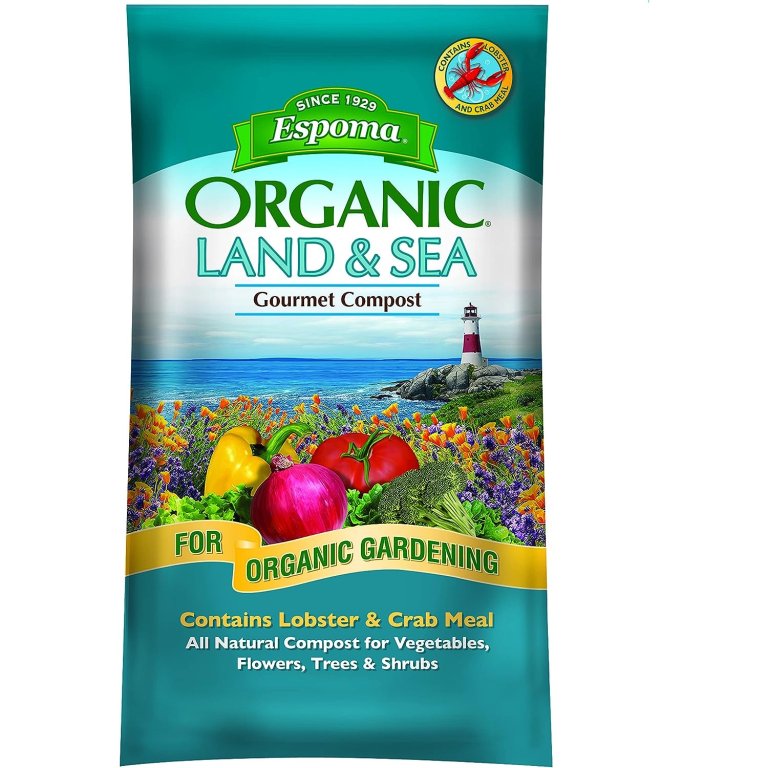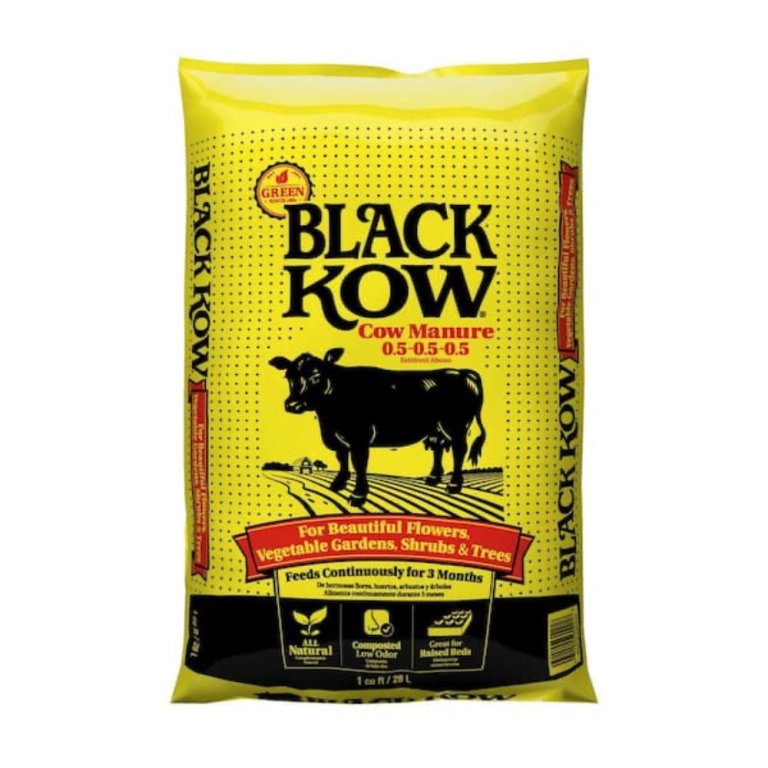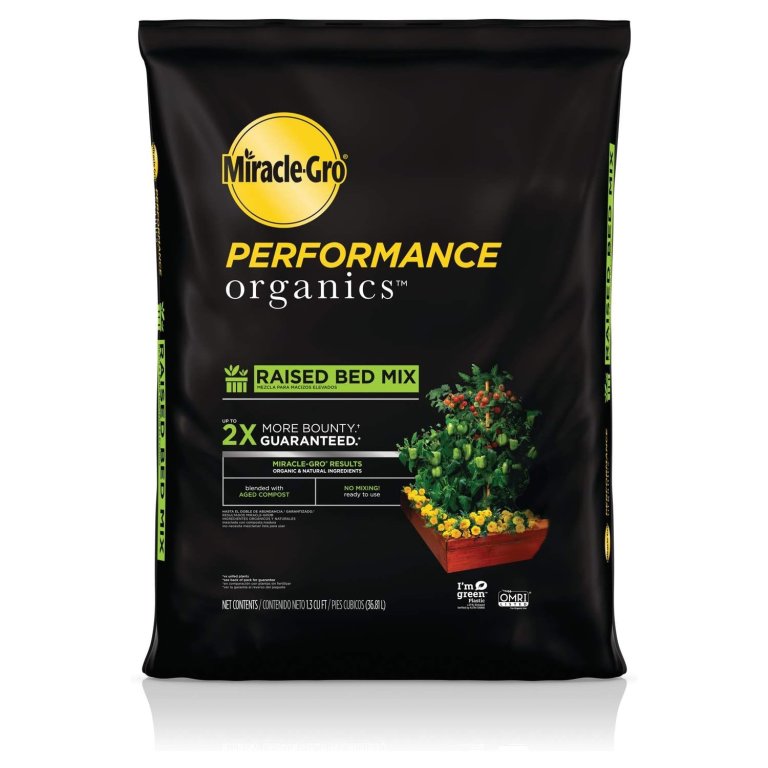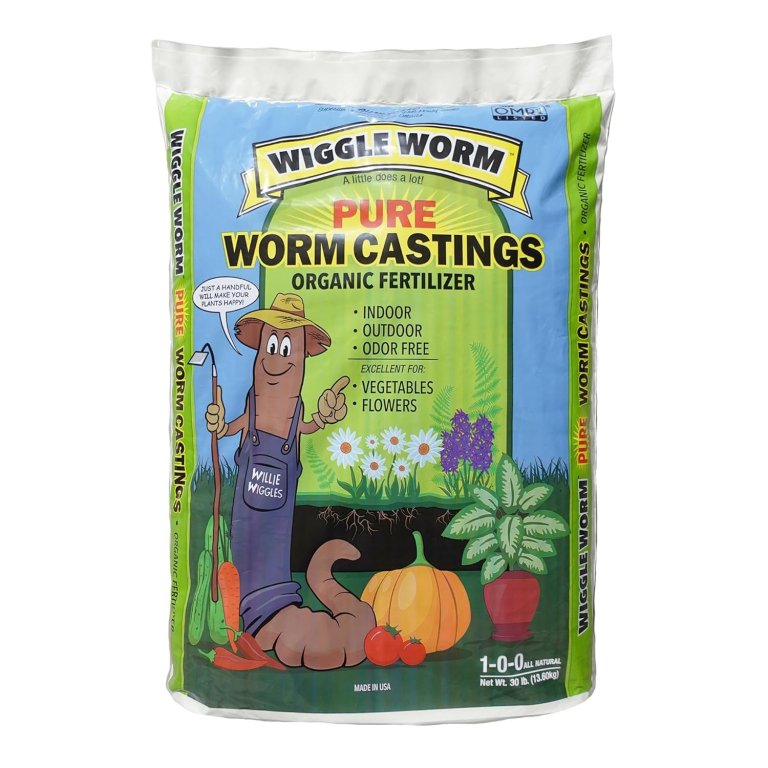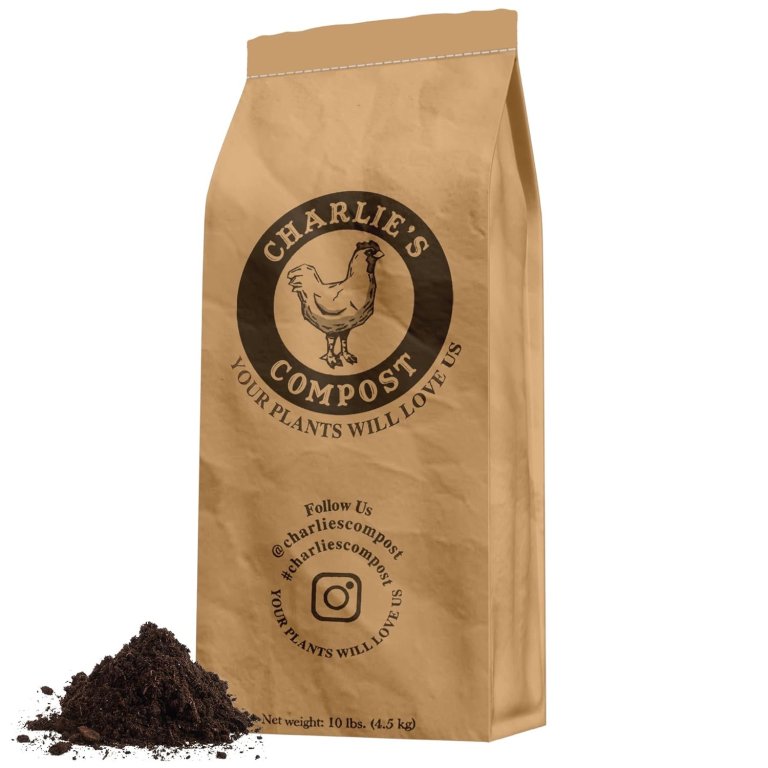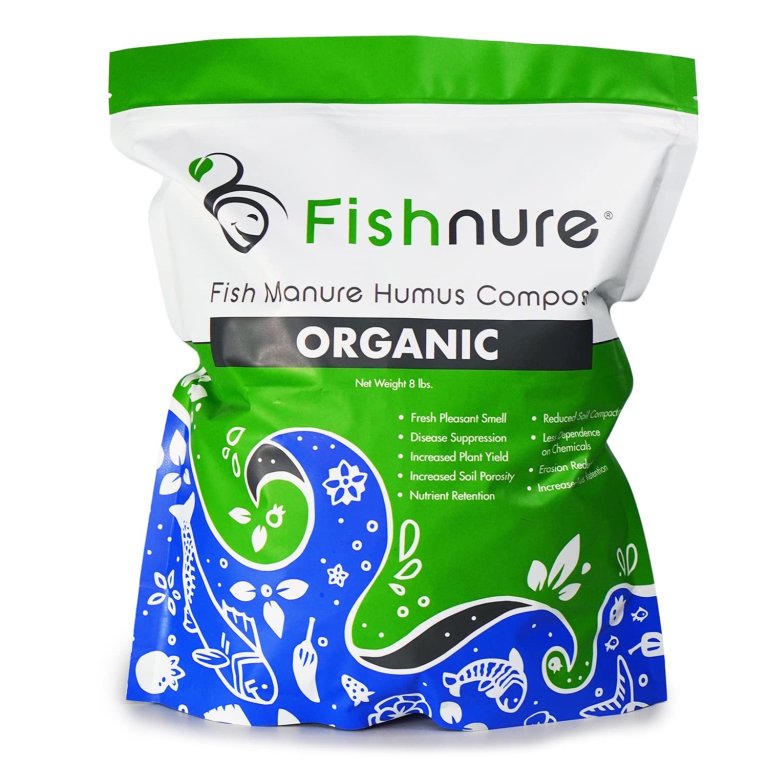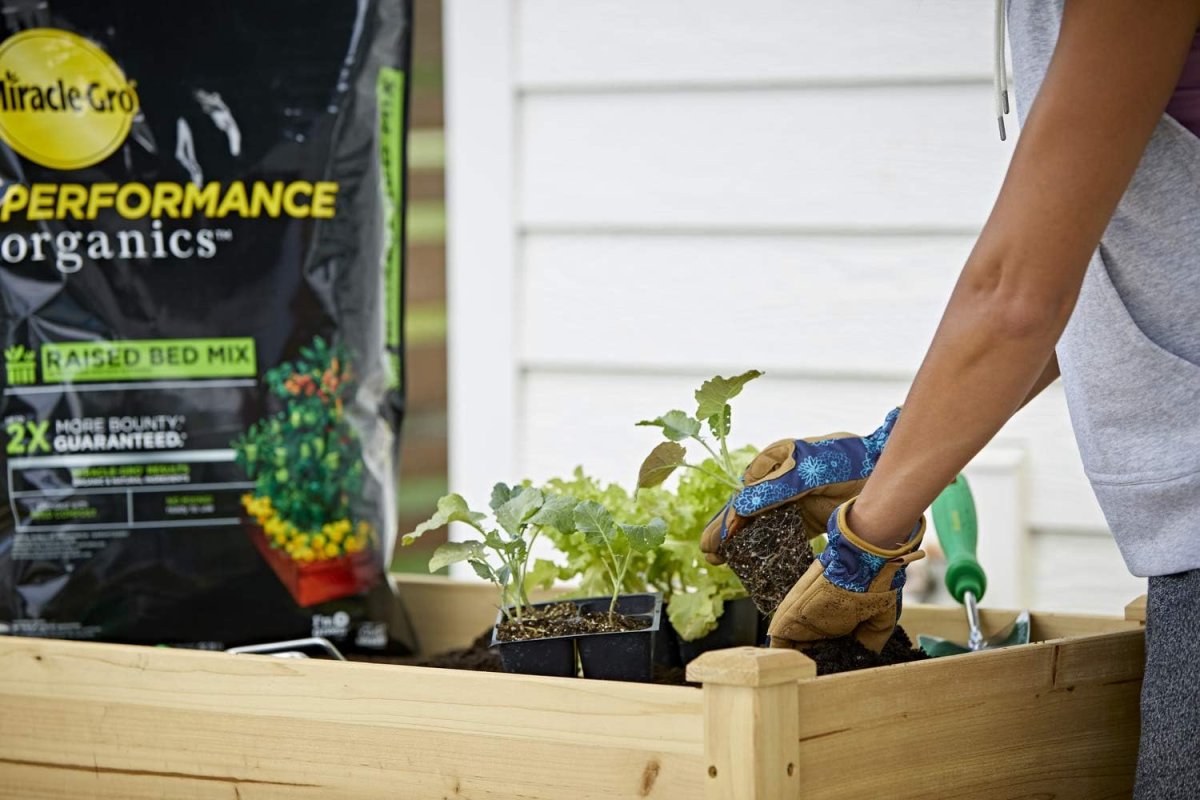
We may earn revenue from the products available on this page and participate in affiliate programs. Learn More ›
For gardeners short on time, bagged compost is a quick way to naturally nourish and balance soil. Compost is Mother Nature’s way of breaking down organic waste into biorich food to help nourish topsoil and plant roots. This process occurs naturally in forests, but outside of these lush environments, adding bagged soil and compost can keep plants healthy and strong. Sometimes referred to as “black gold,” compost is one of the best ways to nourish and balance garden soil, retain soil moisture, and reduce pests and disease by improving soil biome.
Whether you have an indoor plant oasis, are growing raised beds, or have a full outdoor garden, compost is packed with nutrient-rich elements that help support plant growth. Espoma Organic Land & Sea Gourmet Compost topped this list for its quality ingredients and ability to quickly improve plant health. Continue reading to learn more about how to choose the best bagged compost, what an expert recommends to make your own compost, and why plant lovers favor these top choices.
- BEST OVERALL: Espoma Organic Land & Sea Gourmet Compost
- BEST BANG FOR THE BUCK: Black Kow Cow Manure
- BEST FOR RAISED BEDS: Miracle-Gro Performance Organics Raised Bed Mix
- BEST VERSATILITY: Unco Industries Wiggle Worm Soil Builder Worm Castings
- BEST CHICKEN MANURE: Charlie’s Compost
- BEST CONCENTRATED: Fishnure Organic Fish Manure Humus Compost
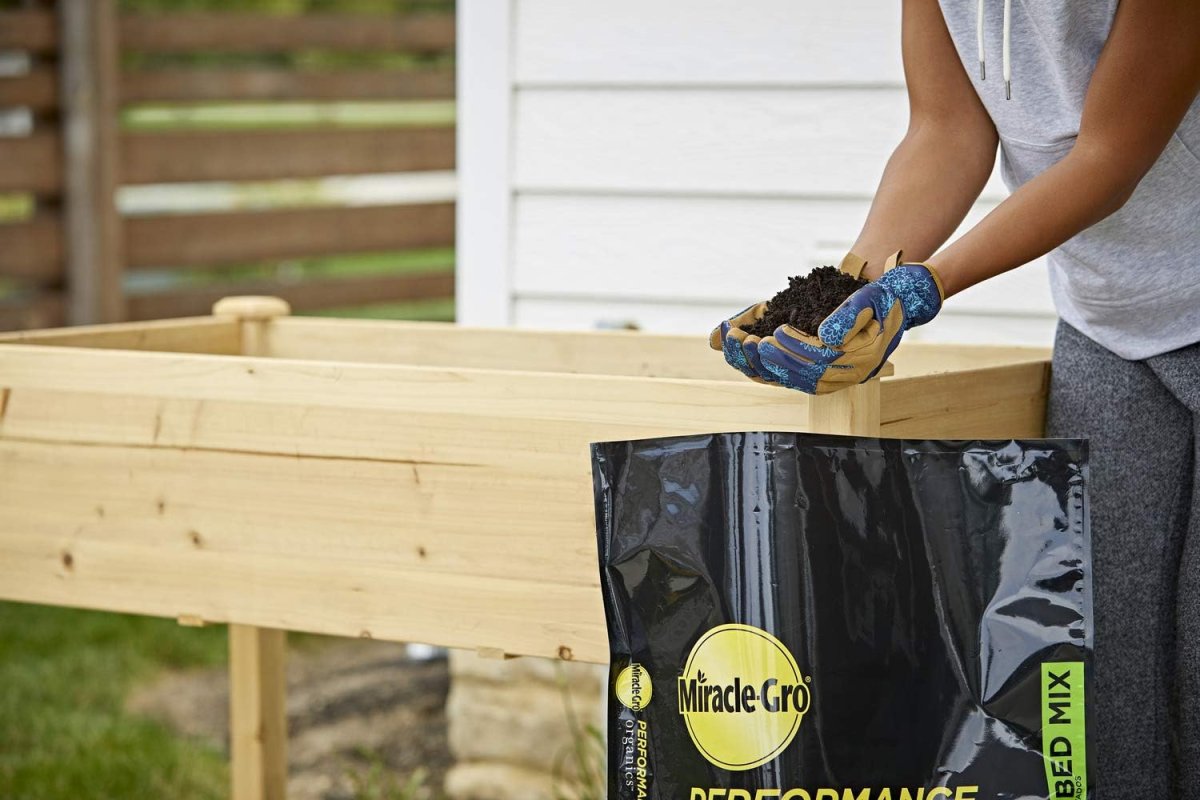
How We Chose the Best Bagged Compost
When choosing the best bagged compost, I drew on my background and experience as a clinical herbalist in gardening, rebuilding soil health (especially in depleted urban settings), and growing medicinal herbs. I’ve used dozens of different bags of compost myself, so when I researched 16 different products for this guide, I looked at the quality and variety of ingredients, whether they were organic, and, based on their ingredients, their ability to retain moisture—-vital for soils for raised beds and customers living in drier climates. I also took into account the available bag sizes, how many cubic feet it covers, and the price per bag. I took user reviews into consideration as well and only considered those with particularly high customer satisfaction.
Our Top Picks
These picks can turn depleted garden soil or potted soil into a nutrient-rich oasis for more bountiful harvests.
Best Overall
Espoma Organic Land & Sea Gourmet Compost
Pros
- Packed with healthy mycorrhiza and pH-neutralizing materials
- Mycorrhiza facilitates plant communication while building soil health
- Users saw more growth after only a few applications
- Attracts helpful insects like beetles that love compost and worms that help build soil
Cons
- Some users noted wood chips in a few bags
Product Specs
- Bag size: 1 cubic foot
- Ingredients: Aged forest products, sphagnum peat moss, limestone, lobster meal, crab meal
- Coverage: 1 bag covers 6 square feet for 2-inch depth
With its proprietary blend of mycorrhiza to encourage healthy, strong root systems for a variety of plants, the Espoma compost enriches soil for new plantings and can be used as dressing for established plants. Espoma blends mycorrhiza with sphagnum peat moss to aerate soil and attract worms, humus that attracts helpful beetles, limestone that increases soil pH, and lobster and crab meals made from shells to revive soil.
While this compost can be mixed with bagging soil for indoor or outdoor plants, it is best for outdoor use. This is because the mycorrhiza builds networks between plants so they can “talk” to each other, which does not happen with a single potted plant. Although some users noted that compost bagging soil had small pieces of wood in it, reviewers overwhelmingly appreciated how quickly this compost worked and how it improved overall soil composition with steady applications. With quality ingredients and real-world results, Espoma topped the list.
Get the Espoma bagged compost at Amazon or Walmart.
Best Bang For The Buck
Black Kow Cow Manure
Pros
- High-quality bagged compost that doesn’t leave an odor
- Easy to break up larger pieces and distribute
- Great value and price for larger gardens
Cons
- Some reviewers noted that bags contained pebbles or wood pieces
Product Specs
- Bag size: 1 cubic foot
- Ingredients: Cow manure
- Coverage: 1 bag covers 6 square feet for 2-inch depth
This fully composted cow manure from Black Kow is low odor and contains millions of beneficial bacteria and nutrients to build soil health and help grow vibrant and strong plants. It’s especially useful in dry and sandy soil to help retain moisture while introducing essential macronutrients and helpful bacteria to boost the soil’s long-term health.
It helps produce faster growth and strong vegetables, fruits, and flowering plants and should be mixed a few inches into the topsoil. It’s hard to beat this price point for the quality of this tried-and-true natural fertilizer.
Get Black Kow bagged compost at Lowe’s, The Home Depot, or Amazon.
Best for Raised Beds
Miracle-Gro Performance Organics Raised Bed Mix
Pros
- Doesn’t require mixing
- Developed specifically for raised beds
- Certified organic by the Organic Materials Review Institute (OMRI)
- Combination of ingredients produces robust plant growth
Cons
- Not available in California
- Limited use compared to other compost
Product Specs
- Bag size: 1.3 cubic feet
- Ingredients: Compost, processed forest products, sphagnum peat moss, yucca, peat, rice hulls, and coir
- Coverage: 1 bag covers 1-square-foot raised bed, 6 inches deep
This Miracle-Gro bagged garden soil contains aged compost mixed with other natural materials to improve moisture retention, help aerate the soil, and increase the distribution and growth of helpful fungi and bacteria, especially in raised beds. It’s an excellent soil for growing vegetables, fruits, and herbs but can also be used in flower beds. This ready-to-use compost mix is a great option for those who need healthy soil fast and want to plant their garden as quickly as possible.
Get Miracle-Gro bagged compost at Amazon, Lowe’s, Ace Hardware, or The Home Depot.
Best Versatility
Unco Industries Wiggle Worm Soil Builder Worm Castings
Pros
- Versatile enough to be used for most plants, trees, and seedlings
- Castings can be made into tea for liquid applications
- Bags are discounted when purchased in bulk at select retailers
Cons
- May vary in quality as some reviewers noted pests in bags
Product Specs
- Bag size: 30 pounds
- Ingredients: Worm castings
- Coverage: 10 to 20 pounds per 1,000 square feet for established vegetables and flowers
This Wiggle Worm soil-building compost is great for those who have a variety of plants and trees in their gardens due to its high nitrogen content. This 30-pound compost bagging mix works in up to 1 cubic foot of soil. It can also be used as a top dressing for established vegetables and flowers; 10 to 20 pounds of the worm castings is enough for 1,000 square feet of garden. It can be made into a tea to give plants, especially diseased plants, extra nourishment.
Get the Unco Industries bagged compost at Amazon or Walmart.
Best Chicken Manure
Charlie's Compost
Pros
- Excellent for indoor and outdoor plants, including fruits and vegetables
- Includes nutrient-packed chicken manure, a concentrated fertilizer
- Immediately introduces helpful bacteria and macronutrients to soil
- Made with vegetarian-fed, antibiotic-free chicken manure
- OMRI certified for true organic quality
Cons
- Available bag size is small
Product Specs
- Bag size: 10 pounds
- Ingredients: Chicken manure, biochar, organic grasses, and residue from organic crop production
- Coverage: 1 quart per 1 gallon of soil
Gardeners who love their plants like some people love their pets may appreciate the quality and clean consistency of Charlie’s bagged organic compost. Containing nutrient-dense chicken manure and other beneficial ingredients, this rich compost has a good ratio for shrubs, trees, or vegetables. Charlie’s is committed to organic, holistic, and sustainable composting practices, and its compost is certified organic by the OMRI. Even though it’s quite expensive for the bag size, it can be added to soil only a few times a year for excellent results.
Get Charlie’s bagged compost at Amazon or Walmart.
Best Concentrated
Fishnure Organic Fish Manure Humus Compost
Pros
- Humus compost; excellent for building soil structure
- Good for indoor and outdoor use
- Concentrated formula; 1 pound covers 60 square feet
- OMRI certified, so it’s safe for use on all plants
Cons
- Some reviewers noticed pebbles in their bag
Product Specs
- Bag size: 8 pounds (also available in 1 pound)
- Ingredients: Fish manure, wheat or oat straw, clay
- Coverage: 1 pound per 60 square feet
This versatile and concentrated 8-pound bag of Fishnure Organic compost is good for feeding newly planted trees, vegetables, herbs, and other plants. It offers plants a quick boost and is made from composted fish manure and straw mixed with clay. It contains small amounts of NPK but a high concentration of microbes that offer sustenance and nutrients to plants.
Get the Fishnure bagged compost at Amazon, Walmart, or Fishnure.
Or, DIY Your Own Compost
According to composting and homesteading expert Ben Falk of Whole Systems Design, which is a Mad River Valley, Vermont, company that designs habitats, “The quality of compost, like so much else, depends on the inputs used to make it.” Falk recommends making your own compost from “kitchen scraps with raked leaves, wood chips, sawdust, and any grass-based local manures.” He also recommends using aged wood chips to increase soil fertility. Customers who have a garden can either buy a plastic compost bin or make their own.
What you put into your compost is just as important as the ratio of inputs. Here’s a quick summary of “composting 101.” To compost at home, you’ll need three parts brown ingredients to one part green ingredients. Brown ingredients include dry leaves, wood chips, sawdust, and straw; green ingredients include vegetable scraps, grass clippings, and garden weeds.
Once you have the right ratio of ingredients, you can then choose one of three methods of composting: hot, cold, or worm composting. Hot composting requires enough heat to cause decomposition. This is done either with a large enough pile of organic matter or with a composting bin. Cold composting is passively managed but does not eliminate weeds, pests, or diseases, so you must be more careful to choose problem-free ingredients.
Worm composting harvests worm poop, also called castings, which are eliminated once the worms eat the organic waste. A worm bin is an excellent indoor option for DIYers who don’t produce much organic waste, have a small dedicated area in their home, and have the time to learn how to feed and care for their worms.
Jump to Our Top Picks
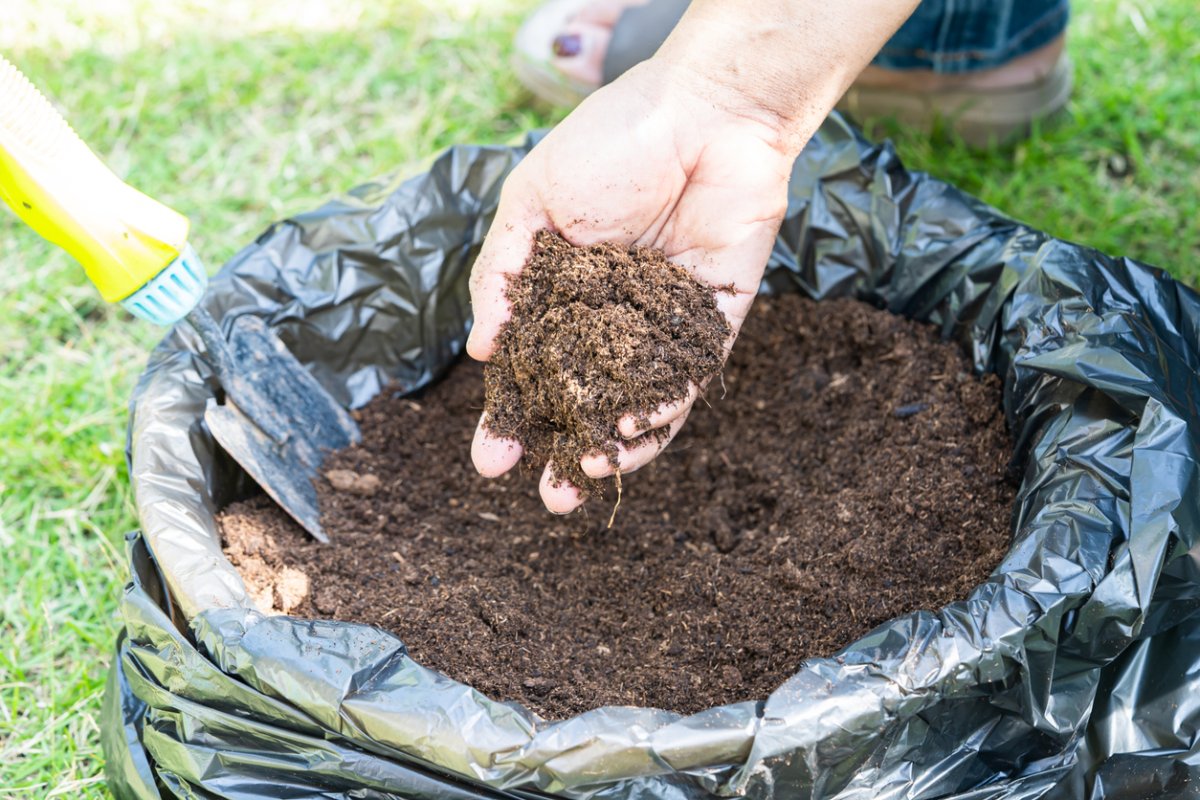
What to Consider When Choosing Bagged Compost
The best bagged compost can help your plants grow healthy and strong and also build soil health that offers more plentiful harvests—even help you grow organic food on the cheap. However, deciding on which to choose depends on several factors, including type, smell, nutrient content, and pH levels.
Type
All compost is decomposed organic material, which may include yard waste, food waste, and/or animal manure. How the organic material is broken down or what the composition of the compost is makes one bagged compost different from another. There are four types of bagged compost available:
- Standard compost is largely made of decomposed organic materials with some fillers added like peat, clay, or coir. Microorganisms, like bacteria and fungi, break down the organic material into compost.
- Worm compost, also known as worm castings or vermicompost, is organic material broken down by worms instead of microorganisms. Both standard compost and worm castings greatly enrich soil for most plants.
- Composted manure from cows, chickens, or other animals is mixed with ingredients such as straw or biochar. Bags of manure are a great option for their nutrient content and, in the case of cow manure, their generally reasonable price.
- Mushroom compost is another viable option but requires sterilization that may contain chemicals such as bleach and isn’t a top choice for some edible plants.
Smell
If created, stored, and packaged correctly, most bagged compost will have a slightly pleasant earthy smell. Avoid compost that has a strong odor, which can be an indicator that it was improperly stored or that there was too much moisture in the bag or not enough air, which can potentially increase bacterial growth. A sharp smell might also mean that something is off balance in the compost itself and, unless you’re a composting expert, might be difficult to neutralize.
Nutrient Content and pH Levels
Most bags of compost have optimal pH levels that range between 6 and 8, which is good for most plants. A full list of ingredients should be on the bag or readily available from the manufacturer. Different types of compost have different concentrations of nutrients such as chicken manure, which is high in calcium, or worm castings that can contain calcium, magnesium, and enzymes that plants love. The NPK content usually found in cow manure can be higher than other types of compost. Opt for specially formulated compost for plants that prefer alkaline or acidic soil, such as those with limestone, which increases pH, or that contain sulfur to improve acid content.
Tips for Using Bagged Compost
Once you’ve chosen a compost appropriate for your plants, apply it to clean soil free of large debris that’s been slightly tilled to aerate the topsoil and make it easier to incorporate. In addition to using the right compost, be sure to use quality garden soil bags. The right soil for growing vegetables, fruits, flowers, or trees is what provides the foundation for long-term plant health, whether in a garden or in a grow bag.
- Choose specially formulated compost for acid- or alkaline-loving plants.
- Mix pure compost into 2 to 4 inches of topsoil.
- Seal or close the compost bag to avoid attracting bugs and to keep it moist.
- Apply compost at least twice a year or more often for heavily depleted soils.
